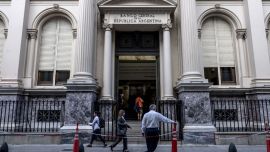Inflation in Argentina slowed to 13.2 percent last month, undercutting forecasts from analysts, data published by the INDEC national statistics bureau showed Tuesday.
Most private analysts had forecast a rate of 15 percent for February, similar to the 15.8 percent projected in the Central Bank’s REM survey of market expectations.
The news is a boost for President Javier Milei, whose government is gradually bringing down inflation. Argentines suffered increases of 20.6 percent in January and 25.5 percent in December.
However, the extent of the ongoing battle was laid clear by INDEC’s annual figure: prices have risen 276.2 percent over the past year and by 36.6 percent over the last two months.
February’s figure is "the result of the national government's work to impose strong fiscal discipline," the president’s office said in a statement.
Some of last month’s rate can be put down to the removal of price controls and subsidies by the government of President Milei, who has moved to slash state spending since taking office.
Challenging months lie ahead, warned the La Libertad Avanza leader in an interview Monday night.
"March is going to be very complicated because it has a very dense seasonality issue, but I do not rule out that in April there will be a sharp drop in inflation," Milei predicted.
Leading increases
Telecommunications rose the most in February, 24.7 percent, followed by transport fares – which soared 21.65 percent following the removal of subsidies.
Utilities, including electricity, gas, water and fuels, which are also being removed, jumped 20.2 percent.
Alcoholic beverages and tobacco were up 17.7 percent, while goods and services rose 16.6 percent. Education (9.9 percent) and clothing and footwear (7.2 percent) were considerably below the monthly average.
Food and non-alcoholic beverages, one of the most-affected sectors in the last year, rose 11.9 percent, with increases led by meat and meat products, bread and cereals; milk, dairy products and eggs.
In an interview on Monday night, Milei had hinted at positive news from INDEC.
"It seems to be below 15 percent, which is a great number," the president said.
He also predicted that inflation could reach single digits in the coming months.
Earlier this week, Economy Minister Luis Caputo declared in a TV interview that the rate would be “closer to 10 percent than 20 percent.”
On Tuesday, with policy-makers forecasting a cooling of inflation, Argentina’s Central Bank cut its benchmark interest rate from 110 percent to 80 percent.
Data released by the Buenos Aires City government last week showed that consumer prices had risen 14.1 percent.
Earlier in the day, the Milei administration announced that it would open up imports for products from the basic food basket, following a meeting between Caputo and representatives from supermarket chains.
"The decision was taken to definitively open imports for certain products from the family shopping basket in order to make prices more competitive, with some tax reductions," said Presidential Spokesman Manuel Adorni.
Adorni admitted that "price rises above inflation expectations have been recognised."
‘Shock’ austerity
Since he took office in December, Milei has slashed public spending, winning the approval of the International Monetary Fund and securing a budget surplus for the first time in 12 years in a country whose previous governments oversaw rampant inflation and multiple fiscal crises.
He devalued the peso by more than 50 percent, halted state subsidies for fuel and transport, cut tens of thousands of public service jobs, and scrapped hundreds of rules in his bid to deregulate the economy.
However, his efforts to slash state spending have hit Argentines hard, with the price of bus tickets almost tripling, and aid cut to thousands of soup kitchens.
And the economy is also experiencing a significant slowdown, with consumption slowing 13.4 percent year-on-year, according to the Focus Market firm.
The inflationary slowdown comes with the economy suffering a significant downturn. Industry and construction are in decline, while consumption is down 13.4 percent year-on-year, according to the Focus Market private consultancy firm.
"Argentina has been in recession for 14 months, but the last four have been the most intense. Prices have risen sharply and consumption has collapsed," said independent economist Federico Glustein.
While the IMF – which has a US$44-billion credit programme with Argentina – has praised Milei's efforts to balance the books, it warned last month about the impacts on the poor.
IMF deputy managing director Gita Gopinath said that austerity measures must be "calibrated to ensure that social assistance continues to be provided and that the burden does not fall entirely on the poorest groups."
Gopinath estimated that Argentina's inflation would drop to single digits by the middle of 2024.
– TIMES with NA/PERFIL/AFP

























Comments